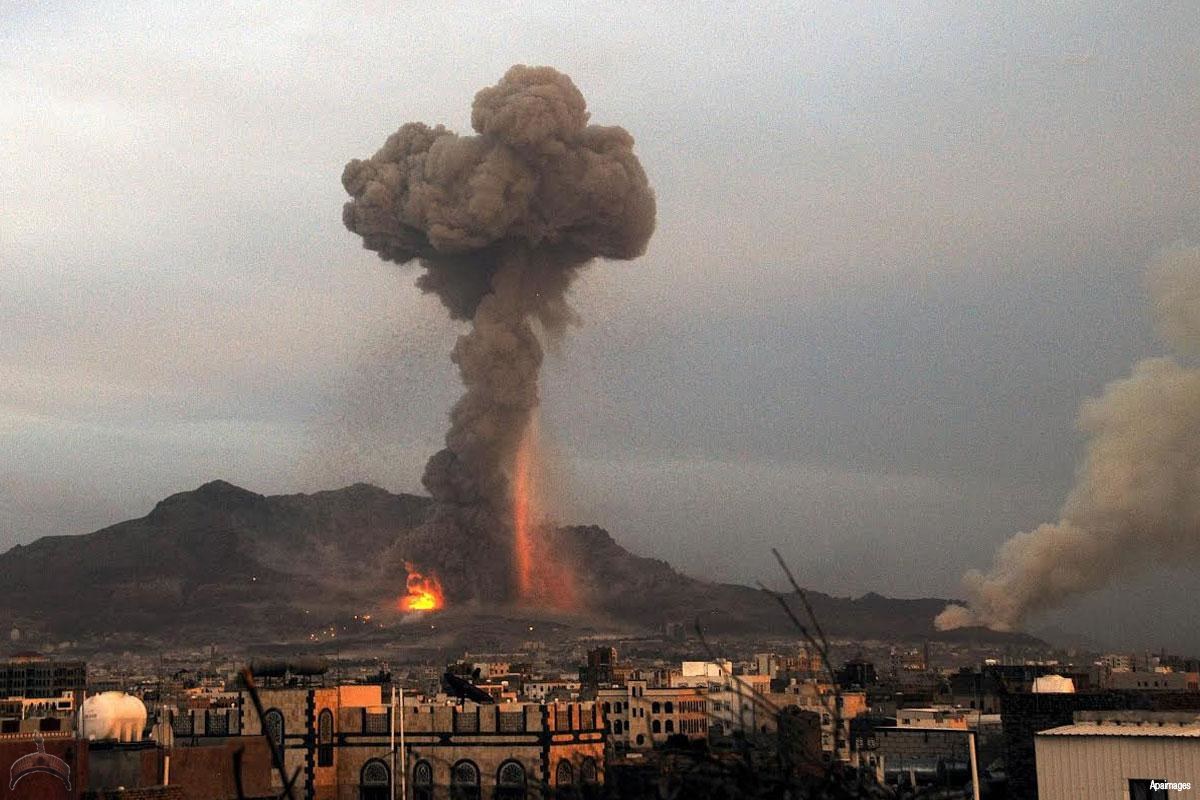by Ramin Mazaheri
Qatar crisis from the Iranian view: Waiting for a feudal revolution, still…
This simplest way to understand the Iranian view of the current Qatar crisis is to grasp this totally-ignored reality: No matter what happens, there are many Iranian politicians, mullahs, social leaders and average citizens who will not stop calling to abolish the Qatari monarchy.
Who makes similar calls in the West? Nobody.
This issue – the political modernization of Qatari society – is never, ever discussed by the Western media during their coverage of the current blockade of Qatar. Nor by their priests or politicians. At the core of their understanding, the West latently believes that “enlightened despotism” is good enough for the Qatari people.
But not Iran. Iran is an avowed supporter for the political modernization of their neighbors and has been for decades.
You cannot ignore the fundamental fact that Iran is a revolutionary society consumed with the idea of spreading modern democracy, especially in the Muslim world. This principle is a vibrant, motivating force in Iranian and regional politics, and it has to be accounted for if you are seeking the Iranian view of Iran-Qatar relations.
Qatar and its kingdom is essentially a feudal structure, and as long as it remains so it cannot – nor will truly want to – ally completely with Revolutionary Iran. This enormous societal difference is – hold on to your hats, Western readers! – a bigger obstacle to close bilateral ties than that phony Shia-Sunni “divide” so ardently promoted by Israel and the United States.
Therefore, any speculation of some sort of new “Iran-Qatar” alliance, joined by Turkey, drastically overstretches the realm of political possibility. (Iran and NATO-member Turkey are not even allied that strongly!)
My point is: Such an alliance would not just be a revolution in regional politics, but it would require an actual revolution in Qatar. As long as Iran follows the tenets of the 1979 Revolution, the Qatari monarchy cannot both ally with Iran and keep their privileges.
Iran would love that the Qatari people left monarchy behind and joined the small list of modern countries – just love it! Sadly, there is no indication from the Qatari Street that this will happen.
For Qatar to ally fully with Iran would be a breathtaking step towards Muslim modernity. But Qatar’s monarchy means it will never have a modern or even a coherent political program: Some rich princes will secretly fund Daesh, while others will fund the superb charity arms of the Muslim Brotherhood.
Again, you will never read this in the media, but Iran’s modern goals of equality and democratic participation are the opposite goals of Qatar’s political structure of feudal monarchy and… this precludes any true alliance between Iran and Qatar.
Given this real hostility, the Qatari monarchy will always keep Iran at an arm’s length; the Iranian people will roll their eyes at the Qatari monarchy and rail against the capitalist injustice of poorly distributed natural resources.
Despite these deeply ingrained differences – again, going far beyond questions of “percentage of Shia in Qatar” – many wonder if Qatar is going to ally with Iran as a response to the demands-by-deadline spearheaded by Saudi Arabia?
The short answer to that is: Not really.
How many of your ‘work friends’ are really your friends?
There is absolutely no doubt that Iran and Qatar will never sever relations …at least not until the last drop of gas is drained from the natural gas field which they share, which is not only the largest in the world but has more recoverable reserves than all the world’s other gas fields combined.
This shared ownership of South Pars/North Dome guarantees at least cordial ties, full stop.
South Pars is the largest economic hub in Iran, and when development is complete in a few years it will produce $100 billion annually and boost Iran’s GDP by 5-6% all by itself. You can see its vital importance to Tehran, and why our end will be defended at all costs by Iran’s navy. Iran is certainly not going to invade Qatar’s end, but I can’t speak for Saudi Arabia.
(What is impressive is how much gas from South Pars is going to be entirely dedicated to domestic consumption.
It’s a staggering feat of Iranian socialism. People say, “Iran is simply buying off its people by providing cheap gas”. Talk about sour grapes, LOL. Yes, that’s what good, true politicians do: provide vital goods and services to its people cheaply and effectively. Then we re-elect them. Repeat process until there is equality. This is democratic modernity, and socialism.)
But, for revolutionary Iran, dealing with the current Qatari leadership ends at this level. This level is merely “mutually beneficial economic cooperation” – a common refrain of Iranian politicians – and not Western capitalism.
To quote Khomeini – who restated this in several forms: “The goal of the Iranian Revolution was not to lower the price of watermelons.” Or to pump more oil.
Iran is simply not going to stop pushing for Muslim democracy, no matter how many rich friends they lose out on.
Qatar is at a crossroads, but is it a ‘Spring’ or an ‘Uprising’
At Iran’s Press TV (my employer) it was never called the “Arab Spring” – it was always the “Arab Uprising”. The Qatar crisis is actually an exciting new front in the history of the Arab Uprising, to Iranians.
The Qatar crisis returns us to the burning, core issue of the Arab Uprising: Overthrowing Western-backed dictators/kings/tribal chiefs and implementing modern Muslim democracy, finally.
This is the 2nd fundamental principle which the West completely ignores when discussing the Qatar crisis!
This criticism cannot be over-stressed! It is as if the West believes that monarchies are part of democracy…but more on that later.
Again, Iran looks at Qatar and it occurs to us: Perhaps an Arab monarchy finally falls over here? Because the Arab Uprising has failed everywhere but Tunisia: Only 1 dictator has been dislodged (so far), and nary even a prince.
A huge reason for this is foreign interference in Egypt, Bahrain and elsewhere: The West does not want to see any upsetting of the status quo. For those not paying attention, the status quo is imperialist capitalism which requires the support of dictatorships (Morocco, Egypt, Saudi Arabia, Israel, etc.) or the creation of total turmoil in modern, Muslim democratic, independent nations (Syria, Iraq, Libya, Afghanistan, etc.).
And this is why nearly everyone – the US, France, Russia – is falling all over each other to mediate an end to this crisis: they want the status quo.
The enemy of revolutionary change is the status quo
What the West and Israel will not accept, of course, is a Qatari revolution: There is no way that Western imperialism will be as effective in the Middle East and Africa if the Qatari people are allowed to use their resources freely to support Muslim democratic movements.
What they can accept – China and Russia included – is something like a 10-20% reduction on the margins. A minor change in the distribution of wealth, but nothing drastic.
Qatar, so incredibly rich, makes such a reduction even less bothersome.
What’s often heard in Iran but never in the West is: Qatar’s allies are not progressive because a large minority of Western nations remain monarchies. Belgium, the Netherlands, Spain, the United Kingdom, Luxembourg, Japan, etc. – the list is neither small nor powerless.
So there is obviously tremendous sympathy for monarchies in these areas, while it is anathema in Iran. This seems to be a latent reason for Western support for Muslim monarchies…but how many journalists want to challenge the status quo and support Muslim democracy, eh?
Iranians know it is totally false to say that a monarchy can be purely symbolic. A so-called “crowned republic” – like the United Kingdom – is an absurd contradiction; the idea that Queen Elizabeth II – the legal owner of 1/6th of the world’s land – plays no influence in political affairs is ludicrous and accepted only by the delusional.
But even many non-monarchies in the West are anti-revolutionary reactionaries, and not just the US. France’s new President Emmanuel Macron has announced that he will write the labor code, and then deign to have Parliament rubber-stamp his decree! Not wanting to get “tangled up” in legislative debate is the opposite of democracy – Muslim, Christian or otherwise.
But there is much more than just cultural sympathy for monarchy at play.
The idea that the US and Saudi Arabia would peacefully “let Qatar go” – i.e., to choose their own path, is without precedent. The US and their 11,000 soldiers will not leave Qatar willingly any more than they have left Guantanamo Bay; Saudi Arabia would propose an even worse blockade. The idea that Qatar would be allowed to go peacefully into the camp of Iran is totally verboten despite the “free marketplace of ideas”.
Saudi Arabia has clearly purchased the right from Trump to embargo Qatar – a scant half-trillion or so in arms sales – and the leading dictatorships of the Arab world are indeed threatening them quite seriously. All of these foreign groups will defend the Qatari monarchy – the status quo – at all costs.
And, obviously, the “enlightened despots” of Qatar are not so enlightened to realize that the people of Qatar should decide things democratically, so the Qatari monarchy will defend their position as well.
So, from without and within, all these forces decrease the odds of a serious, new Iran-Qatar alliance.
Minor changes in overall balance are likely, but no real tipping of the scales; a slight change in where Qatar’s resources go. That is not revolution, but business.
Business, in any anti-capitalist country like Iran, is not political but moral. Morally oppose the Zionist project, for example? Then Iran will support you as much as they can, and not just with moral support.
Bottom line: Qatar will most likely continue to do what small but effective leadership groups do – play on both sides. Pumping oil with Iran but allying with Arab dictators, funding Daesh and the Muslim Brotherhood, etc.
A rare idea: Let’s discuss what a Qatari revolution would look like
Well there’s an idea I’ve never read in an English or French newspaper!
Qatar could be an enormous game changer in 2017 in promoting Muslim democracy…were the people to control their tremendous resources instead of the monarchy.
(But, let’s not forget: Egypt could be an enormous game changer in 2017 in promoting Muslim democracy. Morocco could be an enormous game changer in 2017 in promoting Muslim democracy. Afghanistan could have been an enormous game changer in 1980 in promoting Muslim democracy – catch my drift?)
Iran has nearly no cultural power on a global level. Qatar is different, thanks to the BBC-aping of Al-Jazeera. Their state media has a credibility which cannot be easily tarnished among Western journalists, even if it starts to actually promote modern Muslim democracy. Yes, Twitter suspended Al-Jazeera’s account (love the West’s “free marketplace of ideas”), but the horse is already out of the barn on this one and it could finally be harnessed for democratic good.
Qatar could easily win over the Arab Street if they openly committed to supporting anti-monarchy ideas, anti-imperialist occupations like Zionism, and pro-democracy forces like the Muslim Brotherhood. These are all ideas which the Arab Street wants, after all.
Allying with Iran could very well be the only way Qatar survives an invasion by Saudi Arabia: Iran has gone to the wall for Palestine, and we share no oil fields! But Iranians are not going to fight to prop up a monarchy – that’s what the West has done in the region for a couple centuries….
Obviously, Qatar would be subject to an even worse international blockade than what the Saudis have threatened, because that’s what happens to independent countries. However, they certainly have the economic resources to deal with it and only a small population to care for.
Qatar would have to give up the petty nationalism of “Qatar ethnicity” and realize that the immigrants they host and employ are actually all “Qataris”. That would be a major change, but we are dreaming of a modern revolution here, and such revolutions always reject ethnic rivalries.
So let’s dream even further: 90% of those living in Qatar are immigrants – imagine what enormous global progress they could create were they to give those immigrants citizenship and actually have a democracy? The possibilities for modern, multicultural good stagger the mind….
What Iran will do in the main is to continue its support for democratic Islamic socialism. The problem is – the Qatari monarchy suppresses this.
So there is plenty in common between Iran and Qatar…but there are far too many differences. Both countries, I remind the reader, are Muslim, so religion is not one of them.
Iran, history has proven, does not play realpolitik – that is for Western capitalists and dangerously desperate nations like Israel. France, the US, the UK – they might bow and scrape before the Qatari monarchy in order to sell guns, keep oil cheap and fund stockholder takeovers, but not Iran.
Saudi Arabia and Turkey may rush in and make crazy gambits, but Iran will – as always – move cautiously and preserve its moral and political Revolution first and foremost. Qatar is neither Palestine nor Syria – Iran won’t risk much for them. Get the Qatari people in the street, and then they’ll consider it.
Will Qatar be the first feudal monarchy to fall in a new stage of the Arab Uprising?
That is the main question in Iran. With or without them, our Uprising continues.
Ramin Mazaheri is the chief correspondent in Paris for Press TV and has lived in France since 2009. He has been a daily newspaper reporter in the US, and has reported from Iran, Cuba, Egypt, Tunisia, South Korea and elsewhere. His work has appeared in various journals, magazines and websites, as well as on radio and television.
 Ọmọ Oòduà Naija Gist | News From Nigeria | Entertainment gist Nigeria|Networking|News.. Visit for Nigeria breaking news , Nigerian Movies , Naija music , Jobs In Nigeria , Naija News , Nollywood, Gist and more
Ọmọ Oòduà Naija Gist | News From Nigeria | Entertainment gist Nigeria|Networking|News.. Visit for Nigeria breaking news , Nigerian Movies , Naija music , Jobs In Nigeria , Naija News , Nollywood, Gist and more









